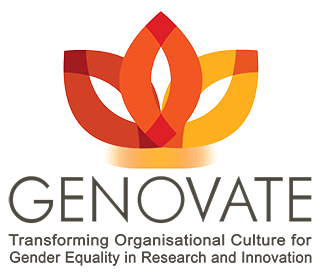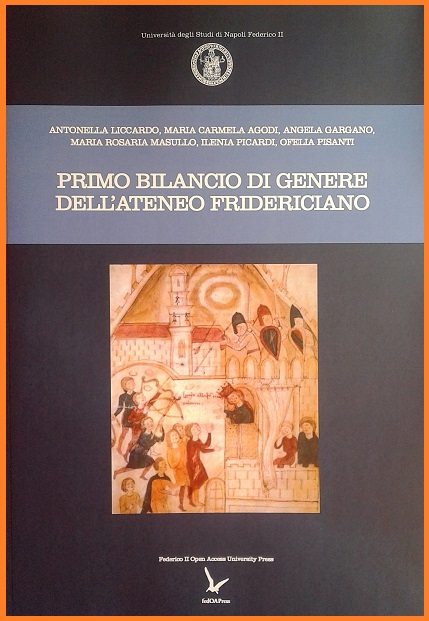 The GENOVATE Community is a platform which enables GENOVATE partners to share institutional information and case studies, and facilitates the coordination of a buddy system for bench learning.
The GENOVATE Community is a platform which enables GENOVATE partners to share institutional information and case studies, and facilitates the coordination of a buddy system for bench learning.
The GENOVATE Community consist of seven GENOVATE partner institutions; the GENOVATE International Advisory Board; key strategic collaborators and stakeholders and the general public. It is a mechanism designed to facilitate meaningful knowledge exchange across the community at local, national and international levels within each of the partner institutions’ countries, across Europe and globally.

For the XXX edition of Futuro Remoto, the team of GENOVATE@UNINA has involved a large audience of visitors on a reflection on the gender dimension in the world of research and innovation.
The interactive exhibition, held on 7-9 October, was based on information on GENOVATE's actions and the presentation of the Gender Observatory on University and Research at the University of Naples Federico II: the first shown through three roll-up panels, the second inviting the audience to associate comic book baloons in which male and female characters had fallen in work situations or discussed about their respective careers.

The first UNINA Gender Observatory on University and Research was established on 18th May 2016. The activity of the Observatory will be disseminated by the Gender Observatory web site (http://www.og.unina.it/), which was realized in the last few months.



In order to ensure the sustainability of GENOVATE project at the Università degli Studi di Napoli Federico II, the Gender Observatory on University and Research has been established in our institution.
The Gender Observatory aims to promote:
The Gender Observatory consists of four research areas:

No gender data, no gender issues in academia. It is for this reason that the UNINA-GENOVATE team has decided to include gender budgeting as a key action in the institutional Gender Equality Action Plan (GEAP). The results of this work, that is the First Gender Budget of the Ateneo Fridericiano, will be presented next Tuesday, 7 June 2016 at 9:30, in the Aula Pessina of the University of Naples Federico II.
Raw data and their focused analysis contained in the first UNINA Gender Budget can become a political and administrative tool to implement the principles of the University Statutes. As stated by the UNINA Rector, Prof. Gaetano Manfredi, in the preface to the First Gender Budget of the Ateneo Fridericiano, “UNINA commits to ensuring equal gender opportunities by strenghtening workers’ protection, and by preventing any form of moral or psychological violence, any overt or covert form of discrimination based on gender, age, sexual orientation, ethnicity, disability, religion, and language.”
The first UNINA Gender Budget illustrates how gender disparities persist on campus: while a growing number of women enrol in university and complete their doctorate, top-level academic positions as well as some fields of knowledge production still remain male dominated. These data show how cultural and structural barriers, on the one hand, contribute to women dropping out of university at the very beginning of scientific careers (i.e. the so-called ‘leaky pipeline’ phenomenon); on the other, the data show the persistence of horizontal and vertical segregation mechanisms, with some disciplinary fields and academic positions dominated by one gender only. Significant gender disparities and quite rigid divisions of labour also appear at the Administration level: male staff is, in general, in charge of technical-scientific roles, while women are, more frequently, in charge of technical-managerial jobs.
On the 7th of June 2016 at 9:30 am, Prof. Gaetano Manfredi, Rector of the Università degli Studi di Napoli “Federico II” will introduce the official presentation of the First Gender Budget of the Ateneo Fridericiano, together with Dr. Francesco Bello, UNINA Administrative Director; then Dr. Chiara Marciani, Councillor for Equal Opportunities of the Campania Region Adminsitrative Division; Dr. Simona Marino, City of Naples Councillor and Delegate of the City of Naples Department for Equal Opportunities; Dr. Concetta Giancola, President of the UNINA CUG (Comitato Unico di Garanzia = Equal Opportunities Committee); and Dr. Ofelia Pisanti, National Scientific Coordinator of GENOVATE will also provide some opening remarks.
In the following section, Dr. Luisa Pulejo, Università degli Studi di Messina (UNIME) will briefly introduce the gender budgeting theme followed by the keynote speaker, Dr. Antonella Liccardo, Coordinator of the Gender Budget working group of GENOVATE@UNINA, who will present the First Gender Budget of the Università degli Studi di Napoli “Federico II”.
The “Gender Budget as a tranformative tool in academia” round table will follow, moderated by Dr. Ilenia Picardi (project manager of GENOVATE@UNINA), with the participation of the renowned statistician Dr. Linda Laura Sabbadini, Order of Merit of the Italian Republic (2006); of Dr. Romana Frattini from CUN (Consiglio Universitario Nazionale = National University Council); and of Dr. Maria Carmela Agodi, Chair of the Research Network RN33-Women’s and Gender Studies of the European Sociological Association (ESA). Conclusive remarks will be provided by Dr. Gaetano Manfredi, UNINA Rector.
The official presentation of the First Gender Budget of the Ateneo Fridericiano is part of the “Happy Birthday Federico II – 1224-2016” initiatives to celebrate UNINA’s seven hundred and two years of academic activity, and it is realized under the patronage of the Italian National University Council (CUN).

UNINA team has agreed with the UNINA FedOAPRESS, the institutional Publishing House of UNINA, to create a book series on "Gender, Science and Society", with the UNINA Gender Budget being the first volume of the series.
This book series aims to construct bridges among different perspectives on issues related to women’s participation in science and in academic professions and organizations in order to articulate a comprehensive treatment of similarities, differences and interactions through and within disciplines and research domains, while linking specific institutional mechanisms and dynamics to broader societal ones.
Three perspectives at least seem to be relevant to this aim: research on gendered societal relations; research on the social organization of science and academy; research on the globalization of the productive relationships and resources of science and techno-science.
The book series will host:
a) Research and theoretical works integrating the gender dimension in the study of systems of scientific knowledge production, transmission, transfer and communication, bridging women’s and gender studies with science, society and technology studies.
b) Studies about research evaluation systems and their differential impact on gender equity; studies that explore exploring criteria and procedures giving value to different dimensions of research quality and excellence; studies that value accounting for the contribution of diversity to in scientific knowledge production and development.
c) Quantitative analyses about women’s participation in science and academy; horizontal and vertical gendered segregation across and within disciplines; differential career paths and opportunities; proposals of gender-sensitive statistical tools and indicators systems; scientific and academic organizations’ gender budgets.
d) Qualitative inquiries into attitudes and behaviours of scientists and researchers related to gender climate and gendered practices in the labs and in research teams; related to the perception of the gender issue in science; related to the perceived relevance of the gender dimension in the production of scientific knowledge, in teaching practices, in knowledge dissemination, communication and use.
e) Research studies about career paths and their gendered structure and about practices aimed at changing structural mechanisms and implicit stereotypes playing against the underrepresented gender.
Powered by Multicategories for Joomla!2.5